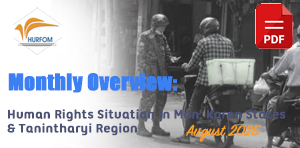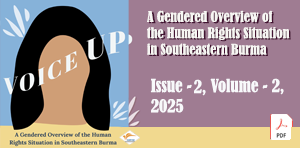Summer paddy abuse intensifies in Kamawat village, Mudon Township
December 28, 2009
HURFOM, Mon State: According to a source in Kamawat village, Mudon Township, the Mudon Township Department of Irrigation and Agriculture has forcing farmers in the region to grow summer season rice paddies since the beginning of November 2009, to compensate for the loss of this year’s rainy season crop; a Kamawat headman has reportedly been using the summer paddy orders as an opportunity to levy various extortion taxes on Kamawat villagers. Sources reported to HURFOM’s reporter that for the last 2 months, they have been forced to pay exorbitant prices for ploughs, rice seeds, and fertilizer.
According to a farmer in the area, villagers have been forbidden from using oxen to plough farmland; the village headman only permits farmers to use the village’s plough machine, which he rents to the farmers for 10,000 kyat per acre. However, the actual standard rent for the plough machine is 8,000 kyat per acre. The village headman retains 2,000 kyat per acre for himself.
“I had two pair of oxen for ploughing but the headman did not allow the use of oxen in summer crops. The headman said to me, ‘our country is developing now. We should not use oxen in ploughing. When others see this, it look bad’ ”, said 45 year-old farmer from Kamarwat.
A Mudon Township Agriculture Department worker from Kamawat who has worked in the field for 20 years told HURFOM’s field reporter that there are two kinds of seeds which are grown in summer rice, referred to as “seasonal fit” and “date fit”. The date fit seeds requires sufficient water and time, while different varieties of seasonal fit seeds require different summer climate conditions and are region specific.
According to a 60 year-old Kamawat man, the Burmese government’s rice seeds sold by the headman were seasonal fit seed who’s climate needs were inappropriate for the Kamawat soil. They also were often sterile; only half of the seeds purchased grew into rice plants. Farmers interviewed by HURFOM’s reporter were unsure of the government’s price for these rice seeds, but claimed that the seeds sold by the headman cost 5,000 kyat per basket [around 25 kg].
“We [farmers] do not want to buy government seeds, but we have to buy them on the orders of high-ranking officials. They [the seeds] do not work in our land. We only waste our time and money on summer rice. We have grown it several times but we never have success with summer rice”, a 50 year-old farmer from Kamawat told HURFOM.
A Kamawat farmer who used to plant summer rice paddies told HURFOM’s field reporter that last year, before farmers grew summer rice, the officials announced that they would provide water for free, but in reality farmers had to purchase crop water from them, and use the government-owned water machine. Even though the farmers had bought water from government’s agricultural staff to use in farmlands, their paddy fields’ production rates were low, because thee farmers could not purchase sufficient water. Farmers lost all that they had invested in their fields and in labor costs, due to water fees.
HURFOM’s reporter also learned that during last year’s harvest season, government authorities patrolled Kamawat farmers’ fields, counting the number of acres owned by each farmer and tallying the amount of rice each acre produced; the information was then reserved and compared to each farmer’s previous production rate records. Many farmers found themselves unable to match previous production rates, as most had been unable to afford enough water to for their fields, and production had therefore suffered. Sources in Kamawat reported that they had been forced to purchase additional rice to supplement their crop yields as means of appeasing government authorities, who demanded that farmers meet the yields of previous years.
Comments
Got something to say?
You must be logged in to post a comment.



















































